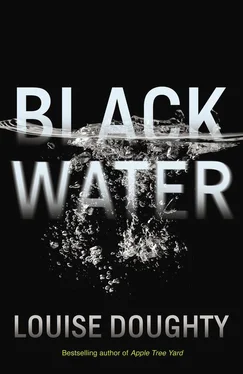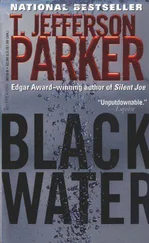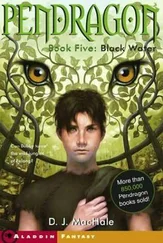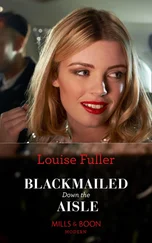Reverend Wilson’s brother took them to the Union Passenger Terminal in his Packard sedan. Jimmy came with them in the car, then was being delivered to neighbours to be looked after while Harper, Nina and Poppa undertook the long journey cross-country. Harper watched the car pull away with Jimmy looking at him out of the back window, his ears high, head on one side slightly, panting a little as it was a hot day. But even then, he did not really feel the weight of his departure, not with Poppa and Nina with him and a long ride on an Interstate to look forward to.
They were standing on the sidewalk in front of the station. They had just waved Jimmy off. Nina was checking their belongings: small travel cases for her and Poppa, his large one; a wicker basket with a lid that was piled high with luncheon-meat sandwiches. When he had asked why she was making so many, she replied, ‘The rest of America isn’t like West Adams. We might not feel too comfortable in some of the restaurants.’
Poppa frowned and scratched his neck. Nina had persuaded him to wear his heavy coat. ‘I’m a little warm in this thing,’ he grumbled.
Just then, a police officer in a peaked cap with a badge wandered up, a leather strap diagonal across his chest, attached to his belt, just above his gun holster. Harper stared at the holster and the heavy-looking black gun: a real gun. He looked up at the officer, a man with a puffy white face and cheery smile, and grinned at him. The officer grinned back.
‘You folks travelling today?’ he asked them, looking at all three of them.
‘I have our tickets here,’ Poppa replied, patting the pockets of his heavy coat.
The officer was looking at Harper, then said, ‘That’s okay, I don’t need to see them. This your child, boy?’
Harper looked at the officer, confused, but Poppa, who had stopped patting his pockets and was standing very still, replied quietly, ‘My grandson.’
The officer reached out a hand and placed it on Harper’s shoulder, giving him a small pat. ‘Nice-looking kid. You look after your grandparents now, son.’
Harper glanced at Poppa, who was staring straight ahead, looked back at the officer and said quickly, ‘Yes, sir.’
And the long journey and the passing countryside led eventually to this: another embarkation shed, a huge thing with a vaulted roof and sawdust floor and great, high windows through which vast shafts of light lit the crowds of passengers below and made travelling clothes, travelling crates, boxes and suitcases all shades of brown and grey, the flat colours of transience. After they had got to the head of a very long queue and put his name on the passenger list, the woman at the desk gave them a sheet of paper with the rules for Unaccompanied Young Persons and handed over a label on a piece of string. He had to wear it around his neck at all times. It had Holland-Amerika Lijn printed on one side and HAL in big capitals on the other with his name, date of birth and his destination written in a sloping hand. Beneath was the name of the person who was meeting him at the port in Rotterdam: Mrs Anika Aaltink .
He was mortified. He had to wear a label like a tiny child would? He was going to be thirteen soon.
‘Just like a parcel,’ Nina said, as she tucked the label inside his jacket, kneeling in front of him, even though that made him taller than her now. All at once, she grabbed him and held her to him. Harper glanced around, over her head. In the corner of the departure shed was a group of teenage boys in school uniform.
‘The most precious parcel in the world,’ Nina said brokenly into his chest. Poppa put his hand gently on her shoulder and patted it until she released him and stood up.
His last sight of Nina and Poppa for eight years came as he exited the departure shed at the far end, on his way to the jetty. When he turned around, they were standing holding on to each other and smiling at him: Poppa tall and bulky in his winter coat and hat, Nina, petite and smiling bravely, both with their hands raised. Nina waved hard and Harper, who had attached himself to the end of the group of boys, lifted his hand in an awkward little half-wave, glancing from one of them to the other quickly, worried that whichever of them was the last one he smiled at, the other might be upset — but at the same time not wanting to embarrass himself in front of the group of big boys just ahead of him.
It was a relief to get out onto the concrete jetty, where the ship loomed and the air smelled of smoke and fuel and a soft rain fell and the business of goodbye was over. Right at that particular moment, the adventure to come seemed adequate compensation for leaving his grandparents behind. The missing them would come later.
*
Travelling the Atlantic Ocean alone, the label round his neck at all times as he had been instructed, even when he was washing — surely it must have made some impression on him? When he tried to remember that voyage, there was something in his head about an ice cream, an ice cream sandwich made with thick soggy slabs of some sort of cookie mixture. A sailor who played cards with him? A little girl in a pinafore? Without his mother there to make the pictures of the voyage, that Atlantic journey at the age of twelve seemed vaguer when he thought back to it than the one he had undertaken with his mother when he was three. Saying goodbye to Poppa and Nina must have been hard but, as far as he remembered, the voyage itself didn’t bother him — being in a state of transition was too familiar to his bones.
The arrival — that was different. Like all the passengers, he hung over the side, watching the coast appear. He joined the melee processing clumsily down the gangplank, bumping his case on the wooden ridges and losing control of it at one point, tripping a young woman in heels just ahead of him. She turned her head back to him, scowling over her shoulder, then stopped, blocking the way for everybody, to adjust her stockings. Then he was on the quay and trapped in a huge crowd of adults who grouped and gathered in greetings before moving off, people clinging to each other. When a clearing opened, he turned to his left and saw, first of all, a barrel-chested man in a tweed coat and black hat who was shouting, ‘ Indié verloren, rampspoed geboren! ’ with his arms wide open. His ruddy face was contorted and open-mouthed, as if he had made a tremendous joke. On her knees next to him, kneeling right there on the wooden planks of the arrivals jetty, was a woman with her hair scraped back in a ponytail that revealed harsh lines leading down from her nostrils to the corners of her mouth. She had tears pouring down her cheeks. She, too, had her arms open and she was crying, ‘Come here! Oh come here, baby boy!’
The power of transience: in motion, you could be whoever you wanted to be. When had he learned this? On that solo Atlantic journey, with the label round his neck? Or earlier, at the age of three, watching his mother cadge cigarettes from different passengers or sailors, varying the details of who she was according to whether she was talking to a man or a woman, a sailor or a fellow passenger? Whatever lessons were learned then, chief amongst them was this: if you don’t want people to know who you are, keep moving.
If you kept moving fast enough, you could be several selves in quick succession. If someone struck up a conversation with you on a plane, you could pretend to be from Macau and single and a brain surgeon — after you had assessed that the person you were talking to was neither from Macau nor a brain surgeon themselves, of course. In the taxi queue outside the airport, you could be a Spanish businessman, widowed with six adorable children. Later that same day, in a hotel bar perhaps, you could say you were psychic and that your mother had been mistress to a Persian king — you could claim you had a fatal disease and only months to live. The possibilities were endless.
Читать дальше












